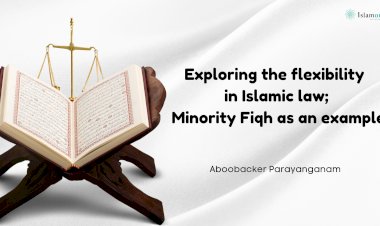An Introduction to the Five Universal Legal Maxims (Al-Qawāʿid Al-Khamsah Al-Kubrā)
The term 'qawāʿid fiqhiyyah' had been defined by al-Subkī, which is among the earliest definitions, as "a general rule which applies to many particulars (juz'iyyātin kathīratin), conducive to comprehend their legal assessments". In juristic discourses, the implication of qāʿidah is also articulated with other terms like aṣl (base), asās (foundation), mabda' (principle), qānūn (law), mas'alah (case), ḍābiṭ (standard), qaḍiyyah (issue), dalīl (evidence), dustūr (rule or constitution), ḥukm (ruling) and so on.
In the qawāʿid genre, the five universal legal maxims (or normative legal maxims) are most important due to their comprehensiveness and their relevance not only to the entire parts of fiqh but also to entire aspects of life in terms of coverage and application. Moreover, they are acceptable to all scholars regardless of various schools of Islamic law. They represent the Sharīʿah as a whole and embody the general concept of maṣlaḥah in particular. The five major qawāʿid are (1) "matters are judged by their objectives (intention)", (2) "certainty cannot be overruled by doubt", (3) "hardship begets facility", (4) "harm must be eliminated" and (5) "custom is authoritative". Some scholars view that the entirety of fiqh is based on these five and the rest is a kind of their explanation.
These five maxims keep strong integrity with the maqāṣid al-sharīʿah (the higher objectives of the Sharīʿah) because these maxims serve as a methodology in achieving the benefits and repelling the harms. Each of these maxims accommodates several subsidiary maxims, which serve as the condition, restriction and explanation.
The first maxim related to intention has a comprehensive scope covering a wide variety of particular cases and is considered to be a fundamental component in the process of legal decision-making. It has a legal role as well as a moral aspect; the former is applicable while dealing with the issues of awareness of an individual and validity of his actions and the latter helps determine the willingness of an individual to submit to Allah's will and to establish the purity of one's actions as well as intentions. This maxim is the interpretation of the ḥadīth; "deeds are governed by intentions, and every person gets but what he has intended" (al-Bukhārī 1: 2).
The maxim of certainty exhibits Sharīʿah's stance regarding the preservation of justice and ease in all matters ranging from the rituals to the criminal law. This maxim has been formulated based on Quranic verses and Prophetic traditions. In the estimation of al-Suyūṭī, this maxim encompasses three-fourths of all legal rulings.
The maxim of hardship is as integral in Islamic legal canon as the importance of the removal of hardship in the general concept of legal rulings. Though the Sharīʿah consists of obligatory duties, it does not impose anything that would be beyond human capacity or individual ability. Based on the principle of concessions or dispensations (rukhṣah), any individual has the right to choose a harmless or more reasonable way if he finds it considerably difficult to fulfil the requirements of the Sharīʿah. One of the primary objectives of Islam is to alleviate the burden for its followers and free them from the difficulties imposed by cultures, customs and religions.
The fourth maxim i.e. the elimination of harm is construed as the prohibition of all actions that carry the notion of wronging, infringing on others’ rights, frustrating, overpowering, or setting back some party's interests. This principle is not absolute rather it is accompanied by limits, as if harm is inflicted to prevent bigger harm, it is treated as justifiable.
The maxim of custom shows Sharīʿah's flexibility to adapt to the exigencies of situations but without going beyond the stipulated parameters. The prevailing custom has been the basis of many legal verdicts in Islamic history.
Some jurists suggest the adding of certain other maxims to the list of universal legal maxims. For example, Ibn Nujaym included lā thawāba illā bi al-niyyah (reward is exclusively based upon the intention). Likewise, al-Burnū and Shubayr regarded the maxim "iʿmāl al-kalām awlā min ihmālihi" (a word should be construed as having some meaning, rather than disregarded) as a universal legal maxim. However, the researcher is not in favour of including them as universal legal maxims because of two reasons. Firstly, they are in some way included in the previously mentioned five maxims and they could be considered as sub-maxims. Secondly, although they are applicable in many particular cases, they are not as comprehensive as the five universal legal maxims.
References
Al-Bāḥusayn, Yaʿqūb bin ʿAbd al-Wahhāb. (1998). Al-Qawāʿid al-Fiqhiyyah: al-Mabādi’, al-Muqawwimāt, al-Maṣādir, al-Dalīliyyah, al-Taṭawwur. Riyāḍ: Makthabat al-Rushd.
Ibn al-Subkī, Tāj al-Dīn ‘Abd al-Wahhāb. (1991). Al-Ashbāh wa al-Naḍā’ir. Beirut: Dār al-Kutub al-’Ilmiyyah.
Ibn Nujaym, Zayn al-Dīn. (1405 AH). al-Ashbāh wa al-Naẓā’ir .Damascus: Dār al-Fikr.
Al-Nadwī, ‘Alī Aḥmad. (1998). Al-Qawāʿid al-Fiqhiyyah: Mafhūmuhā, Nash’atuhā, Taṭawwuruhā, Dirāsat Mu’allafātihā, Adillatuhā, Muhimmātuhā, Taṭbīqātuhā. Damascus: Dār al-Qalam.
Al-Būrnū, Muḥammad Ṣidqī. (1996). al-Wajīz fī Īḍāḥ al-Qawāʿid al-Fiqhiyyah (2nd and 4th edn.). Beirut: Mu’assasat al-Risālah.
Al-Burnū, Muḥammad Ṣidqī. (2003). Mawsūʿat al-Qawāʿid al-Fiqhiyyah. Beirut: Mu’assasat al-Risālah.
Al-Sadlān, Ṣāliḥ. (1417 AH). Al-Qawāʿid al-Fiqhiyyah al-Kubrā. Riyādh: Dār Balansiyah.
(Dr. Sayyed Mohamed Muhsin is an Assistant Professor in Kulliyah of Islamic Revealed Knowledge and Human Sciences, International Islamic University Malaysia)
Disclaimer
The views expressed in this article are the author’s own and do not necessarily mirror Islamonweb’s editorial stance.

























Leave A Comment